This essential resource provides comprehensive revision materials for dental nurse students‚ covering key topics like medical emergencies‚ restorative dentistry‚ and infection control. It serves as a valuable self-assessment tool for exam preparation.
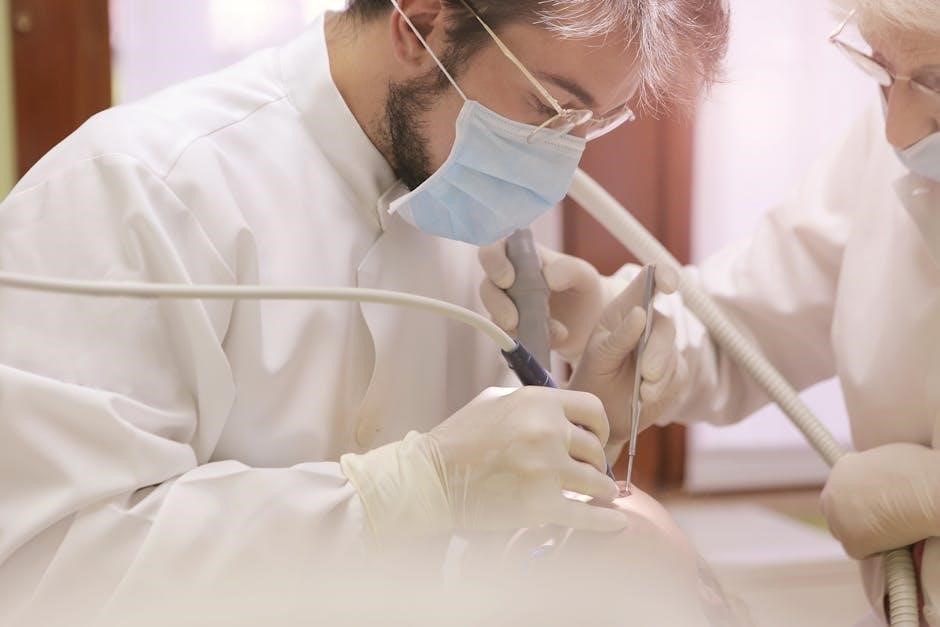
Overview of the Importance of Revision Guides
Revision guides are indispensable tools for dental nurse students‚ offering a structured approach to exam preparation. They provide comprehensive coverage of key topics‚ ensuring a thorough understanding of essential concepts. These guides often include multiple-choice questions (MCQs) and extended matching questions (EMQs)‚ mirroring exam formats to familiarize students with the assessment style. By focusing on areas like dental materials‚ restorative dentistry‚ and medical emergencies‚ revision guides help identify knowledge gaps and strengthen weak areas. Regular practice with these resources reinforces learning‚ builds confidence‚ and enhances problem-solving skills. Many guides‚ such as the “Questions and Answers for Dental Nurses” series‚ are tailored to specific qualifications‚ ensuring relevance and alignment with exam syllabi. They also emphasize professional development and ethical considerations‚ preparing students for real-world challenges. Ultimately‚ revision guides are vital for effective study‚ enabling students to approach exams with confidence and clarity.
Structure and Content of the Guide
The guide is structured to provide a logical progression of learning‚ starting with foundational topics and advancing to complex clinical procedures. It is divided into key sections‚ each focusing on specific areas of dental nursing‚ such as dental materials‚ restorative dentistry‚ and medical emergencies. Within these sections‚ multiple-choice questions (MCQs) and extended matching questions (EMQs) are included‚ mirroring the format of professional exams like the NEBDN examination and the NVQ in Oral Health Care. The content is tailored to align with the syllabus‚ ensuring that all critical areas are covered. Additionally‚ the guide includes practical advice on infection control‚ health and safety protocols‚ and patient care‚ making it a holistic resource for exam preparation. Regular updates ensure the material reflects the latest industry standards and developments‚ providing students with a reliable and current study aid.
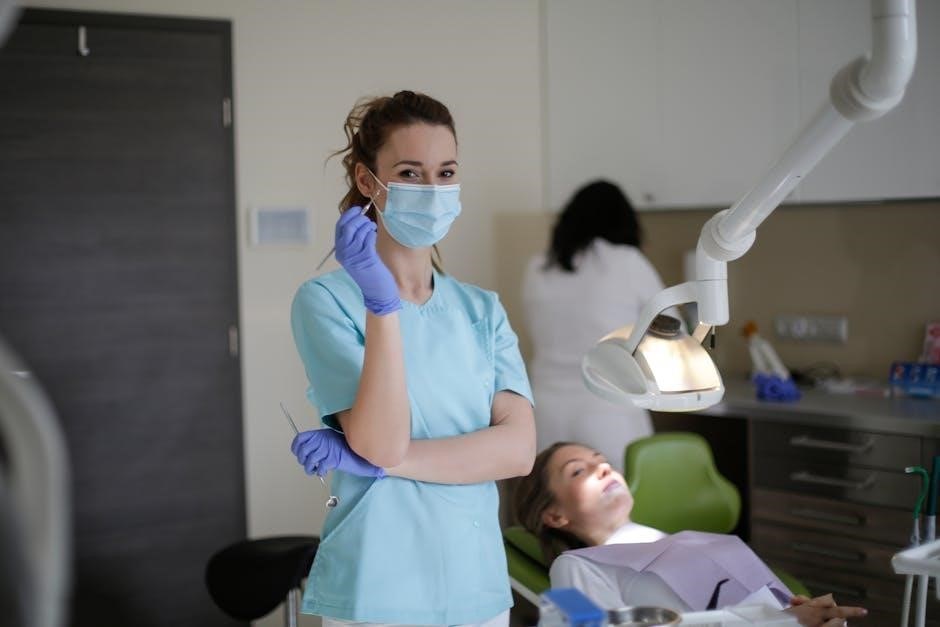
Key Topics Covered in Dental Nurse Exams
Dental materials‚ restorative dentistry‚ oral surgery‚ anesthesia‚ medical emergencies‚ orthodontics‚ radiography‚ and health and safety are key topics covered‚ ensuring comprehensive preparation for dental nurse exams and professional practice.
Dental Materials and Instruments
Dental materials and instruments are fundamental components of dental nursing practice. This section covers the properties‚ uses‚ and handling of various materials‚ such as amalgams‚ composites‚ and impression materials. It also details the proper care and sterilization techniques for dental instruments‚ ensuring infection control. Understanding the correct selection and preparation of materials is crucial for assisting in procedures effectively. The guide provides multiple-choice questions and case studies to test knowledge‚ helping dental nurses identify the appropriate instruments for specific treatments and maintain a safe clinical environment. This topic is essential for both theoretical understanding and practical application‚ ensuring dental nurses can efficiently support dentists and hygienists during procedures while adhering to health and safety protocols. Regular review of these concepts is vital for staying updated with advancements in dental materials and instrumentation.
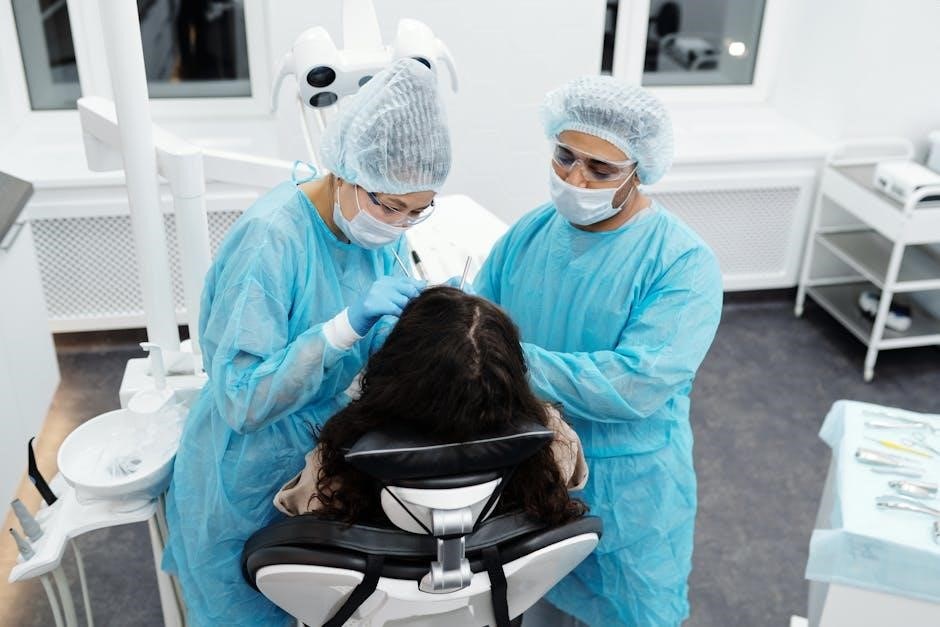
Restorative Dentistry and Procedures
Restorative dentistry focuses on the repair and replacement of damaged or missing teeth‚ enhancing both function and aesthetics. This section explores common procedures such as fillings‚ crowns‚ bridges‚ and dentures. Dental nurses play a crucial role in assisting these treatments‚ from preparing materials like amalgam and composite resins to maintaining asepsis and patient comfort. The guide offers questions and case studies to deepen understanding of techniques‚ materials‚ and patient care. It emphasizes the importance of accurate documentation and effective communication with both patients and dental teams. Additionally‚ it covers post-operative advice‚ ensuring patients understand how to care for their restorations. This topic is vital for dental nurses to master‚ as it directly impacts patient outcomes and satisfaction. Regular practice with the provided exercises helps reinforce key concepts and prepares individuals for real-world scenarios in restorative care.
Oral Surgery and Anesthesia
Oral surgery and anesthesia are critical areas in dental nursing‚ focusing on patient care during surgical procedures. Dental nurses must understand the types of anesthesia‚ including local‚ conscious sedation‚ and general anesthesia‚ and their applications. The guide provides detailed questions and answers on assisting in extractions‚ biopsies‚ and implant placements‚ as well as monitoring vital signs and managing potential complications. It emphasizes pre- and post-operative care‚ such as preparing the surgical site‚ handling instruments‚ and ensuring patient comfort. Anesthesia administration protocols and emergency management‚ like airway obstruction or allergic reactions‚ are also covered. Practical scenarios and multiple-choice questions help reinforce understanding of these procedures. This section is essential for dental nurses to ensure safe and effective patient care during oral surgery. Regular revision of these topics is crucial for building confidence and competence in clinical settings. The guide also includes tips for handling anesthesia-related emergencies‚ making it a valuable resource for exam preparation and professional development.
Medical Emerencies in Dental Settings
Medical emergencies in dental settings require prompt and effective management to ensure patient safety. Dental nurses must be well-prepared to handle situations such as anaphylaxis‚ cardiac arrest‚ seizures‚ and asthma attacks. The guide provides detailed questions and answers on emergency protocols‚ including the use of emergency drugs‚ CPR techniques‚ and the proper use of equipment like automated external defibrillators (AEDs). It also covers the role of the dental nurse in recognizing early signs of distress‚ assisting the dentist‚ and maintaining patient records. Common emergency scenarios are presented through multiple-choice questions and practical case studies‚ allowing dental nurses to test their knowledge and decision-making skills. The section emphasizes the importance of teamwork‚ effective communication‚ and staying calm under pressure. Regular revision of these topics is crucial for building confidence and ensuring quick‚ appropriate responses during real-life emergencies. This section is vital for dental nurses to provide safe and effective care in critical situations.
Orthodontics and Radiography
Orthodontics and radiography are critical areas of dental care that dental nurses must understand to support effective treatment and patient safety. The guide covers fundamental concepts in orthodontics‚ such as types of braces‚ patient care during treatment‚ and maintenance procedures. It also addresses radiography techniques‚ including intraoral and extraoral X-rays‚ ensuring dental nurses can assist in capturing high-quality images. Common questions focus on the role of dental nurses in preparing patients for orthodontic procedures‚ monitoring progress‚ and providing post-treatment advice. Radiography sections emphasize radiation safety‚ positioning techniques‚ and infection control during imaging. Multiple-choice questions and case studies help dental nurses apply their knowledge in practical scenarios. This section is designed to enhance understanding of orthodontic and radiographic procedures‚ enabling dental nurses to contribute effectively to patient care and diagnostic accuracy. Regular revision of these topics ensures proficiency in supporting both routine and complex treatments.
Health and Safety Protocols
Health and safety protocols are a cornerstone of dental nursing practice‚ ensuring the well-being of both patients and staff. The guide emphasizes infection control measures‚ including proper hand hygiene‚ sterilization of instruments‚ and the use of personal protective equipment (PPE). It also covers sharps management‚ waste disposal‚ and exposure control plans to prevent occupational hazards. Common questions address scenarios involving accidental needlestick injuries‚ chemical spills‚ and fire safety procedures. The importance of maintaining a clean and safe clinical environment is highlighted‚ with practical tips on surface disinfection and equipment maintenance. Additionally‚ the guide explores emergency preparedness‚ such as responding to medical emergencies like cardiac arrests or allergic reactions. By adhering to these protocols‚ dental nurses can minimize risks and ensure a safe‚ efficient workflow in dental settings. Regular updates in the guide reflect the latest guidelines and best practices in health and safety. This section is vital for building confidence in managing everyday challenges.
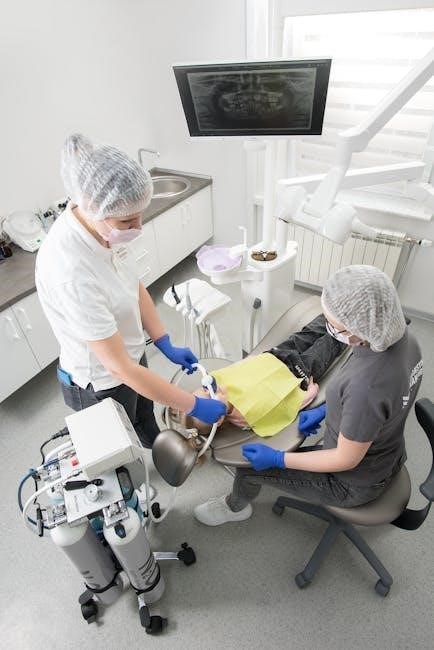
Clinical Procedures and Patient Care
Covers essential clinical skills‚ including patient assessment‚ infection control‚ and pre/post-operative care. It addresses practical scenarios‚ ensuring dental nurses provide high-quality‚ patient-centered support while maintaining safety and efficiency in clinical settings.
Pre- and Post-Operative Patient Advice
Effective pre- and post-operative patient advice is crucial for ensuring smooth dental procedures and patient recovery. Dental nurses play a key role in educating patients about necessary preparations before treatment‚ such as dietary restrictions‚ medication adjustments‚ and hygiene practices. Post-operative care instructions are equally important‚ covering wound management‚ pain relief‚ and follow-up appointments. Clear communication helps reduce patient anxiety and promotes adherence to recommendations. Topics include infection control measures‚ bleeding management‚ and dietary advice to avoid complications. This section also addresses specific considerations for different procedures‚ such as extractions or implant placements. By providing comprehensive guidance‚ dental nurses contribute to better patient outcomes and satisfaction. Proper documentation of advice given ensures continuity of care and accountability. Understanding patient needs and tailoring advice accordingly is essential for holistic care.
Patient Assessment and Diagnosis
Patient assessment and diagnosis are critical steps in dental care‚ requiring thorough evaluation to identify oral and systemic health issues. Dental nurses play a vital role in gathering patient information‚ including medical history‚ allergies‚ and previous treatments. They assist in conducting preliminary checks‚ such as measuring blood pressure and assessing oral hygiene. Accurate documentation of findings ensures effective communication with the dental team. Key aspects include observing soft tissue conditions‚ noting signs of periodontal disease‚ and identifying anomalies in tooth structure. Dental nurses also prepare diagnostic tools‚ like radiographs and impressions‚ to aid in precise diagnoses. Effective patient assessment contributes to personalized treatment plans‚ improving outcomes and patient satisfaction. Understanding the principles of diagnosis enables dental nurses to support clinicians in delivering evidence-based care. This process underscores the importance of attention to detail and strong interpersonal skills in building trust with patients. Continuous learning and adherence to clinical guidelines enhance the quality of care provided.
Infection Control and Prevention
Infection control and prevention are fundamental to maintaining a safe environment in dental settings. Dental nurses play a crucial role in implementing strict hygiene protocols to minimize the risk of cross-infection. Key measures include the use of personal protective equipment (PPE)‚ such as gloves‚ masks‚ and eye protection‚ and ensuring proper hand hygiene before and after patient contact. Surface disinfection and sterilization of instruments are essential‚ with autoclaves being a primary method for sterilizing equipment. Proper handling and disposal of sharps and biohazardous waste are also critical to prevent infection spread. Dental nurses must adhere to clinical guidelines and regulations‚ such as those set by the GDC‚ to maintain high standards of infection control. Regular training and updates on best practices are vital to stay informed about new protocols. Effective infection control not only protects patients but also ensures the safety of the dental team‚ making it a cornerstone of ethical and professional dental care.
Oral Health Education and Promotion
Oral health education and promotion are vital components of a dental nurse’s role‚ aiming to empower patients with knowledge to maintain good oral hygiene and prevent dental issues. Dental nurses play a key role in educating patients about proper brushing and flossing techniques‚ diet advice‚ and the importance of regular dental check-ups. They also provide personalized guidance on preventing conditions such as tooth decay‚ gum disease‚ and bad breath. Effective communication skills are essential to ensure patients understand and implement the advice given. Additionally‚ dental nurses often distribute educational materials and demonstrate oral hygiene products to enhance patient understanding. Promoting oral health not only improves individual well-being but also contributes to public health by reducing the prevalence of preventable dental conditions. By tailoring advice to meet the specific needs of patients‚ dental nurses can make a significant impact on long-term oral health outcomes.
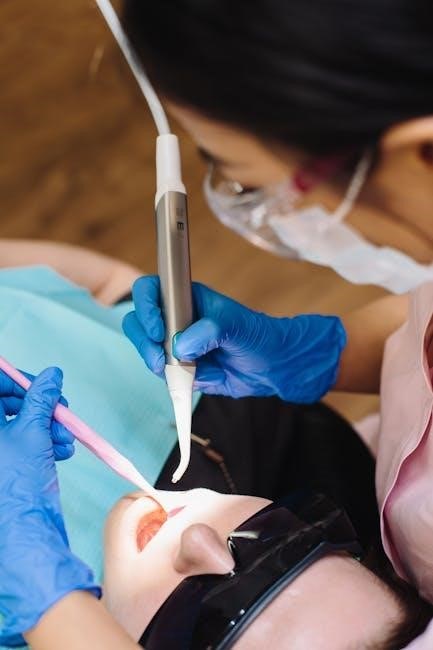
Professional Development and Ethics
Professional development and ethics are crucial for dental nurses‚ focusing on understanding legal responsibilities‚ maintaining ethical practices‚ and adhering to GDC standards to ensure high professional conduct within the dental team.
Role of the Dental Nurse in the Team
The dental nurse plays a vital role within the dental team‚ providing essential support during procedures‚ ensuring patient comfort‚ and maintaining efficient workflow. They assist dentists‚ prepare instruments‚ and manage patient records‚ contributing to effective communication and teamwork. Additionally‚ they are responsible for infection control‚ pre- and post-operative care‚ and educating patients on oral hygiene. Their role extends to handling emergencies and adhering to health and safety protocols‚ making them indispensable in both clinical and administrative settings. Effective collaboration with other professionals‚ such as hygienists and receptionists‚ is key to delivering high-quality patient care. Understanding their responsibilities helps dental nurses work cohesively‚ upholding professional standards and ethical practices as outlined by the GDC. This section explores the multifaceted duties and expectations of dental nurses‚ emphasizing their importance in modern dentistry.
Legal and Ethical Considerations
Understanding legal and ethical considerations is crucial for dental nurses to maintain professional integrity and adhere to regulatory standards. The General Dental Council (GDC) sets clear guidelines for conduct‚ emphasizing patient-centered care‚ confidentiality‚ and informed consent. Dental nurses must respect patient autonomy‚ ensuring that all treatments are explained and agreed upon. Confidentiality is paramount‚ with strict rules about sharing patient information. Additionally‚ dental nurses must be aware of their legal responsibilities‚ including accurate record-keeping and reporting concerns about patient safety or unethical practices. They must also stay updated on laws related to health and safety‚ data protection‚ and equality. Failure to comply with these standards can result in legal consequences or GDC disciplinary actions. This section explores key ethical dilemmas and legal obligations‚ providing guidance on navigating complex situations while maintaining trust and professionalism in dental practice.
GDC Standards and Professional Conduct

The General Dental Council (GDC) sets strict standards for dental nurses to ensure professional and ethical practice. These standards emphasize patient-centered care‚ maintaining trust‚ and upholding professional boundaries. Dental nurses must communicate effectively with patients‚ respect their autonomy‚ and ensure informed consent. They are also required to maintain accurate records and handle confidential information securely. Continuous professional development is essential‚ as dental nurses must stay updated on best practices and legal requirements. Adhering to GDC standards ensures safe and effective care‚ fostering trust between patients and dental professionals. Failure to meet these standards can lead to disciplinary actions‚ highlighting their importance in maintaining professional integrity. This section provides detailed insights into the GDC’s expectations‚ helping dental nurses understand their responsibilities and uphold the highest standards of conduct in their practice.

Interview Preparation for Dental Nurses
Preparation is key to excelling in dental nurse interviews. Practice common questions like “Tell me about yourself” and “Why apply for this position.” Review practical assessments and tips for confident‚ professional responses to succeed.
Common Interview Questions and Answers
Preparedness for dental nurse interviews is crucial‚ as employers often ask about experience‚ responsibilities‚ and problem-solving skills. Common questions include‚ “Tell me about yourself‚” “Why have you applied for this position?” and “How do you handle difficult patients?” Additionally‚ behavioral questions like‚ “Describe a time you worked well in a team‚” are frequent. Scenarios involving infection control‚ medical emergencies‚ and patient care are also explored. Employers seek candidates who demonstrate clear communication‚ empathy‚ and professionalism. Reviewing resources like the Fourth Edition of Questions and Answers for Dental Nurses can provide insights into expected queries. Practicing responses to topics such as health and safety protocols‚ legal considerations‚ and patient assessment is advisable. These questions aim to evaluate both clinical knowledge and interpersonal skills‚ ensuring candidates align with the dental team’s goals and ethical standards. Preparation enhances confidence and the ability to articulate relevant experiences effectively during interviews.

Behavioral and Scenario-Based Questions
Behavioral and scenario-based questions are designed to assess a candidate’s problem-solving skills‚ teamwork abilities‚ and adherence to professional standards. These questions often focus on real-life situations‚ such as handling difficult patients‚ managing medical emergencies‚ or maintaining infection control protocols. For example‚ interviewers may ask‚ “Describe a time you had to work under pressure in a dental setting‚” or “How would you respond if a patient experienced anxiety during a procedure?” These questions aim to evaluate how well candidates apply their knowledge and skills in practical scenarios. Interviewers also explore ethical dilemmas‚ such as confidentiality breaches or conflicts with colleagues‚ to gauge decision-making and professionalism. By practicing responses to these types of questions‚ dental nurses can demonstrate their ability to think critically and align with the expectations of the dental team. Reviewing guides like Questions and Answers for Dental Nurses can help prepare for these challenging queries.
Preparing for Practical Assessments

Practical assessments are a critical component of dental nurse training‚ evaluating clinical skills and hands-on competence. These assessments often involve tasks such as instrument handling‚ infection control procedures‚ and patient preparation. To excel‚ candidates should practice scenarios like assisting in procedures‚ maintaining asepsis‚ and using dental materials effectively. revision guides‚ such as Questions and Answers for Dental Nurses‚ provide sample questions and exercises that mirror real-life challenges. Mock exams and simulation exercises can also help build confidence and familiarity with the assessment format. Focus on mastering key areas like restorative dentistry‚ oral surgery‚ and radiography‚ as these are frequently tested. Regular practice and review of professional standards will ensure readiness for the practical evaluation. Additionally‚ understanding the legal and ethical considerations in patient care is essential for a polished performance. By combining theoretical knowledge with practical expertise‚ dental nurses can approach these assessments with confidence and professionalism.
This comprehensive guide provides dental nurses with essential knowledge and practical insights‚ ensuring they are well-prepared for exams‚ interviews‚ and real-world challenges. It remains a vital tool for professional growth and excellence.
Final Tips for Successful Exam Preparation
To excel in your dental nurse exams‚ prioritize consistent revision using resources like the Fourth Edition of Questions and Answers for Dental Nurses. Focus on understanding key areas such as dental materials‚ restorative dentistry‚ and medical emergencies. Practice with multiple-choice questions (MCQs) and extended matching questions (EMQs) to familiarize yourself with the exam format. Regularly review infection control‚ health and safety protocols‚ and legal considerations‚ as these are frequently tested topics. Utilize flashcards for quick recall of essential terms and concepts. Additionally‚ simulate exam conditions by setting timed practice sessions to enhance time management skills. Engage in active learning by discussing complex topics with peers or mentors. Stay updated with the latest GDC standards and professional conduct guidelines. Finally‚ ensure a healthy work-life balance to maintain focus and reduce exam stress. By systematically addressing each topic and practicing regularly‚ you can confidently approach your exams and achieve success.
